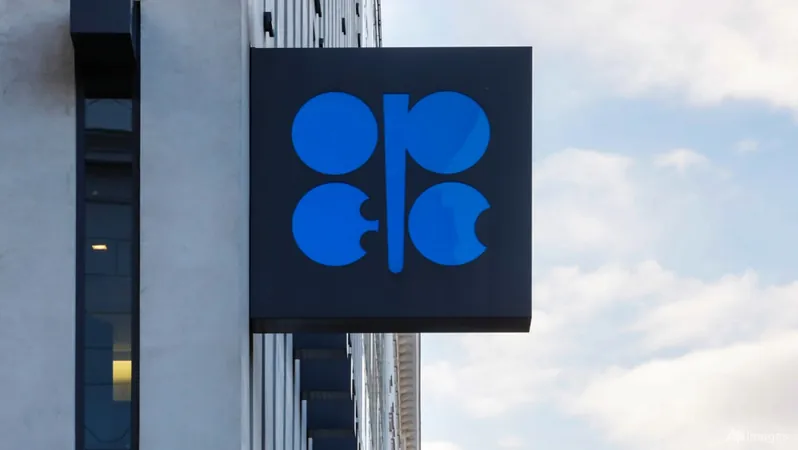
OPEC+ Faces Crucial Decision: Will Oil Production Rise Amid Market Uncertainty?
2025-09-07
Author: Wei Ling
Uncertainty Shadows Upcoming OPEC+ Meeting
LONDON: Tension and uncertainty grip the oil market as Saudi Arabia, Russia, and six other pivotal members of the OPEC+ alliance gear up for a crucial meeting on Sunday, September 7. Analysts suggest that a potential production increase is on the table.
The "Voluntary Eight" and Market Pressures
Known as the "Voluntary Eight" (V8), this group includes Saudi Arabia, Russia, Iraq, the United Arab Emirates, Kuwait, Kazakhstan, Algeria, and Oman. These nations convene as oil prices continue to drop amidst expectations of oversupply in the coming months. As a countermeasure, the broader OPEC+ coalition has enforced substantial output cuts, totaling nearly six million barrels per day (bpd) over the past few years.
Shift in Strategy: From Cuts to Hikes
Since April, there’s been a noticeable pivot in policy for the V8, with a growing emphasis on reclaiming market share and agreeing on output increases. A week ago, sources indicated that these nations were poised to maintain their current output levels into October.
Falling Prices Amid Supply Increase
Currently, oil prices linger between $65 and $70 per barrel, reflecting a staggering 12% drop this year. The surge in production from non-OPEC+ nations and tariffs that curtail demand are major contributing factors. Rystad Energy analyst Jorge Leon anticipates a further decline in demand during the fourth quarter, given the typical seasonal slowdown.
Potential Production Adjustments?
However, recent chatter suggests that a quota adjustment might be considered for October. Saxo Bank’s Ole Hansen states that such a measure could signal the group’s serious intent to regain market share, even if it risks pushing prices below $60 a barrel. OPEC’s own assessments indicate a possible room for additional oil in the market in the upcoming quarters.
Geopolitical Tensions at Play
As market players keep a vigilant eye on geopolitical tensions, particularly surrounding Moscow's conflict in Ukraine, U.S. President Donald Trump's recent actions add another layer of complexity. His administration has ramped up tariffs on nations purchasing Russian oil, with a firm stance against European reliance on Russian exports.
The Future of Oil Prices in Question
Potential curbs on Russian oil exports could create new avenues for OPEC+ producers, but the impact on Russia—already the second-largest oil producer—remains a concern, especially as it attempts to maintain high prices to fund its military endeavors. As the OPEC+ meeting approaches, all eyes will be on their next strategic move amidst these turbulent market conditions.





 Brasil (PT)
Brasil (PT)
 Canada (EN)
Canada (EN)
 Chile (ES)
Chile (ES)
 Česko (CS)
Česko (CS)
 대한민국 (KO)
대한민국 (KO)
 España (ES)
España (ES)
 France (FR)
France (FR)
 Hong Kong (EN)
Hong Kong (EN)
 Italia (IT)
Italia (IT)
 日本 (JA)
日本 (JA)
 Magyarország (HU)
Magyarország (HU)
 Norge (NO)
Norge (NO)
 Polska (PL)
Polska (PL)
 Schweiz (DE)
Schweiz (DE)
 Singapore (EN)
Singapore (EN)
 Sverige (SV)
Sverige (SV)
 Suomi (FI)
Suomi (FI)
 Türkiye (TR)
Türkiye (TR)
 الإمارات العربية المتحدة (AR)
الإمارات العربية المتحدة (AR)